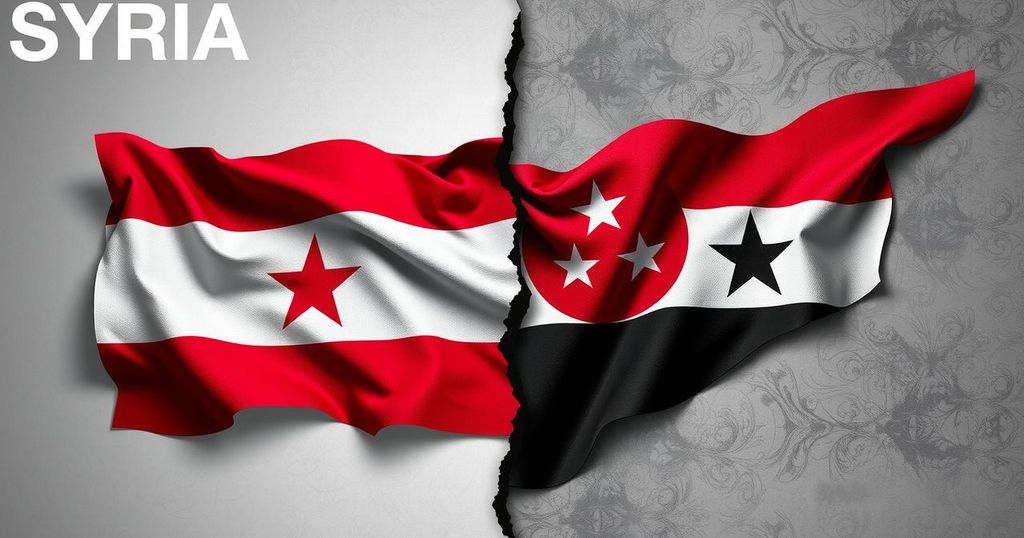Recent high-level visits by Western and Arab leaders to Syria reveal a growing trend to legitimize a designated terrorist organization amid deteriorating conditions. The divide between Western and Arab perspectives underscores differing motivations regarding Syria’s political future, while misinterpretations of regional leaders complicate efforts toward stability. The landscape is significantly influenced by immigration concerns, rising extremism, and the strategic interests of key players like Türkiye and Israel.
The recent visits of Western and Arab leaders to Syria, accompanied by significant economic support, reflect a concerning rush to legitimize a group internationally recognized as a terrorist organization. This entity, lacking any legal or constitutional mandate to govern a war-torn nation afflicted by civil strife since 2011, appears to be advancing its agenda disguised as an internationally approved regime. This trend not only raises ethical concerns but also signifies a troubling campaign to rehabilitate a terrorist organization’s image through substantial financial backing.
Furthermore, a sharp contrast emerges between the anticipations of Western nations regarding the new Syrian regime and the differing aspirations of Arab countries, including Türkiye. Western nations are primarily motivated by two pressing issues: a surge in illegal immigration from conflict-ridden regions and an alarming rise in violence and extremism, leading to increased casualties across Europe. These concerns have prompted Western political landscapes to lean towards strict immigration policies, often at the expense of human rights, reflecting a broader fear of instability that has arisen from the political unrest in the Middle East. Consequently, this has driven the West to exert pressure in establishing regional models that align with their strategic interests.
In contrast, Arab nations demonstrate diverse perspectives on recent developments in Syria. Some states have historically financed extremist political factions to secure regional influence, while others engage in this arena out of necessity for internal stability amid regional rivalries. Countries await a clearer outline of their positions, particularly as they anticipate changes with the new American administration under Donald Trump.
Türkiye perceives the shifting dynamics in Syria as a strategic opportunity for negotiations with Israel, as they aim to mitigate the waning influence of Iran. Ankara believes that the entity filling this void could potentially address numerous contentious issues, including the Kurdish crisis and disputes concerning Mediterranean gas resources. This ambition aligns with Türkiye’s long-standing goals dating back to the dissolution of the Ottoman Empire.
Israel’s role in this context is also pivotal. For over half a century, Israel has seen the Assad regime’s survival as a stabilizing factor. The Golan Heights area has notably been devoid of violent conflict since 1973, yet the lack of formal peace agreements raises questions. Surprisingly, Tel Aviv’s support for the removal of Assad appears unlikely, given recent developments, including the Biden administration’s historic arms acquisition deal with Israel, valued at over $8 billion. Additionally, Israel has consistently targeted Syrian military installations through various airstrikes, emphasizing its strategic interests.
The complexities of regional politics are further underscored by the portrayal of leaders such as Ahmed Al-Sharaa, also known as Abu Mohammad Al-Julani. Analysis often reflects a Western cultural bias, misinterpreting his actions as pragmatic rather than ideologically driven. The Middle East remains significantly impacted by tribal and sectarian conflicts, which continue to shape its socio-political landscape. Unlike in the West, where religious wars have largely diminished, such divisions remain prominent drivers of turmoil in the region.
The perception of Al-Julani, shaped by Western interpretations of diplomacy and pragmatism, overlooks the underlying tensions within the Arab world, marked by cultural nuances. Western officials may view his moderate demeanor as a shift towards reform; however, his strategy is fundamentally rooted in Islamic tactics such as ‘taqiyya’—a practice aimed at concealing true intentions. Thus, the allure of his apparent pragmatism is misleading, as he remains an extremist driven by a vision that fundamentally contradicts Western values.
The inevitable shock that may ensue for Western policymakers when recognizing the true nature of Al-Julani’s ideology reveals a critical misalignment. Intent on advancing a jihadist agenda, Al-Julani utilizes the façade of diplomacy and Western misapprehension to fortify his position and that of his followers, complicating any potential for reconciliation or stability in the region.
The Syrian conflict, which began in 2011, has escalated into a complex web of international and regional interests, with various actors striving to influence the outcome. The governance of Syria remains a contentious issue, particularly as groups previously labeled as terrorist organizations gain legitimacy. Understanding the socio-political dynamics among Western and Arab nations is vital to grasp the conflicting agendas and aspirations surrounding Syria’s future. The diverging perspectives highlight the broader implications of regional stability, immigration pressures, and the ongoing struggle against extremism, amid the backdrop of changing political leadership in key nations.
In conclusion, the West and Arab nations hold fundamentally different views regarding the future of Syria, influenced by their unique geopolitical concerns. While Western nations prioritize controlling immigration and combating extremism, Arab countries exhibit a spectrum of strategic motivations often tied to regional power dynamics. Moreover, the misinterpretation of figures like Al-Julani highlights the perilous disconnect between cultural understandings, further complicating reconciliation efforts and underscoring the enduring complexities of Middle Eastern politics. As efforts to legitimize disputed leadership continue, the stark reality of ideological extremism and regional fragmentation poses a formidable challenge to peace and stability in the region.
Original Source: www.dailynewsegypt.com






